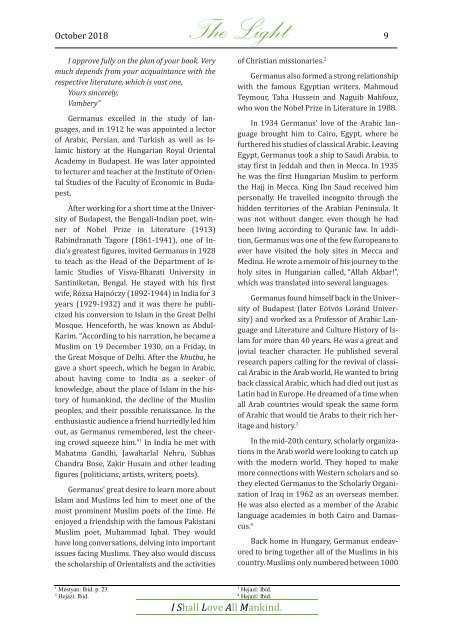The Light 2018 10 October
Representing the Lahore-Ahmadiyya Movement's interpretation of Islam as a peaceful, inclusive, rational, scientific and loving religion.
Representing the Lahore-Ahmadiyya Movement's interpretation of Islam as a peaceful, inclusive, rational, scientific and loving religion.
Create successful ePaper yourself
Turn your PDF publications into a flip-book with our unique Google optimized e-Paper software.
<strong>October</strong> <strong>2018</strong> <strong>The</strong><br />
<strong>Light</strong> 9<br />
I approve fully on the plan of your book. Very<br />
much depends from your acquaintance with the<br />
respective literature, which is vast one,<br />
Yours sincerely,<br />
Vambery”<br />
Germanus excelled in the study of languages,<br />
and in 1912 he was appointed a lector<br />
of Arabic, Persian, and Turkish as well as Islamic<br />
history at the Hungarian Royal Oriental<br />
Academy in Budapest. He was later appointed<br />
to lecturer and teacher at the Institute of Oriental<br />
Studies of the Faculty of Economic in Budapest.<br />
After working for a short time at the University<br />
of Budapest, the Bengali-Indian poet, winner<br />
of Nobel Prize in Literature (1913)<br />
Rabindranath Tagore (1861-1941), one of India’s<br />
greatest figures, invited Germanus in 1928<br />
to teach as the Head of the Department of Islamic<br />
Studies of Visva-Bharati University in<br />
Santiniketan, Bengal. He stayed with his first<br />
wife, Ro zsa Hajno czy (1892-1944) in India for 3<br />
years (1929-1932) and it was there he publicized<br />
his conversion to Islam in the Great Delhi<br />
Mosque. Henceforth, he was known as Abdul-<br />
Karim. “According to his narration, he became a<br />
Muslim on 19 December 1930, on a Friday, in<br />
the Great Mosque of Delhi. After the khutba, he<br />
gave a short speech, which he began in Arabic,<br />
about having come to India as a seeker of<br />
knowledge, about the place of Islam in the history<br />
of humankind, the decline of the Muslim<br />
peoples, and their possible renaissance. In the<br />
enthusiastic audience a friend hurriedly led him<br />
out, as Germanus remembered, lest the cheering<br />
crowd squeeze him.” 1 In India he met with<br />
Mahatma Gandhi, Jawaharlal Nehru, Subhas<br />
Chandra Bose, Zakir Husain and other leading<br />
figures (politicians, artists, writers, poets).<br />
Germanus’ great desire to learn more about<br />
Islam and Muslims led him to meet one of the<br />
most prominent Muslim poets of the time. He<br />
enjoyed a friendship with the famous Pakistani<br />
Muslim poet, Muhammad Iqbal. <strong>The</strong>y would<br />
have long conversations, delving into important<br />
issues facing Muslims. <strong>The</strong>y also would discuss<br />
the scholarship of Orientalists and the activities<br />
of Christian missionaries. 2<br />
Germanus also formed a strong relationship<br />
with the famous Egyptian writers, Mahmoud<br />
Teymour, Taha Hussein and Naguib Mahfouz,<br />
who won the Nobel Prize in Literature in 1988.<br />
In 1934 Germanus’ love of the Arabic language<br />
brought him to Cairo, Egypt, where he<br />
furthered his studies of classical Arabic. Leaving<br />
Egypt, Germanus took a ship to Saudi Arabia, to<br />
stay first in Jeddah and then in Mecca. In 1935<br />
he was the first Hungarian Muslim to perform<br />
the Hajj in Mecca. King Ibn Saud received him<br />
personally. He travelled incognito through the<br />
hidden territories of the Arabian Peninsula. It<br />
was not without danger, even though he had<br />
been living according to Quranic law. In addition,<br />
Germanus was one of the few Europeans to<br />
ever have visited the holy sites in Mecca and<br />
Medina. He wrote a memoir of his journey to the<br />
holy sites in Hungarian called, “Allah Akbar!”,<br />
which was translated into several languages.<br />
Germanus found himself back in the University<br />
of Budapest (later Eo tvo s Lora nd University)<br />
and worked as a Professor of Arabic Language<br />
and Literature and Culture History of Islam<br />
for more than 40 years. He was a great and<br />
jovial teacher character. He published several<br />
research papers calling for the revival of classical<br />
Arabic in the Arab world. He wanted to bring<br />
back classical Arabic, which had died out just as<br />
Latin had in Europe. He dreamed of a time when<br />
all Arab countries would speak the same form<br />
of Arabic that would tie Arabs to their rich heritage<br />
and history. 3<br />
In the mid-20th century, scholarly organizations<br />
in the Arab world were looking to catch up<br />
with the modern world. <strong>The</strong>y hoped to make<br />
more connections with Western scholars and so<br />
they elected Germanus to the Scholarly Organization<br />
of Iraq in 1962 as an overseas member.<br />
He was also elected as a member of the Arabic<br />
language academies in both Cairo and Damascus.<br />
4<br />
Back home in Hungary, Germanus endeavored<br />
to bring together all of the Muslims in his<br />
country. Muslims only numbered between <strong>10</strong>00<br />
1<br />
Mestyan: Ibid. p. 23.<br />
2<br />
Hejazi: Ibid.<br />
3<br />
Hejazi: Ibid.<br />
4<br />
Hejazi: Ibid.<br />
I Shall Love All Mankind.














